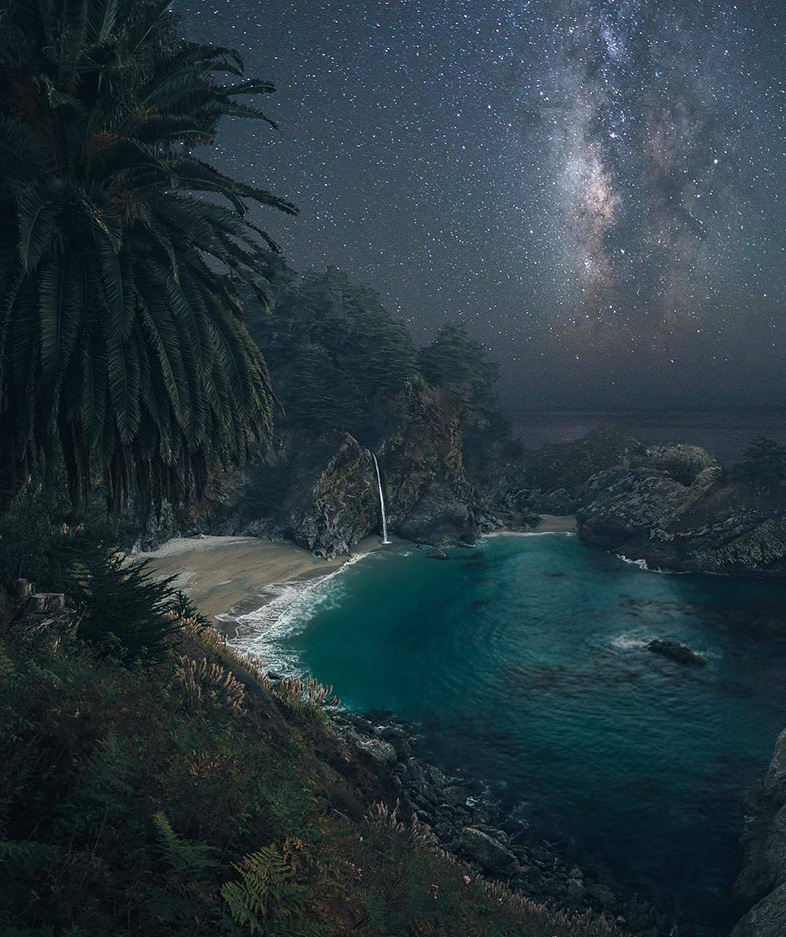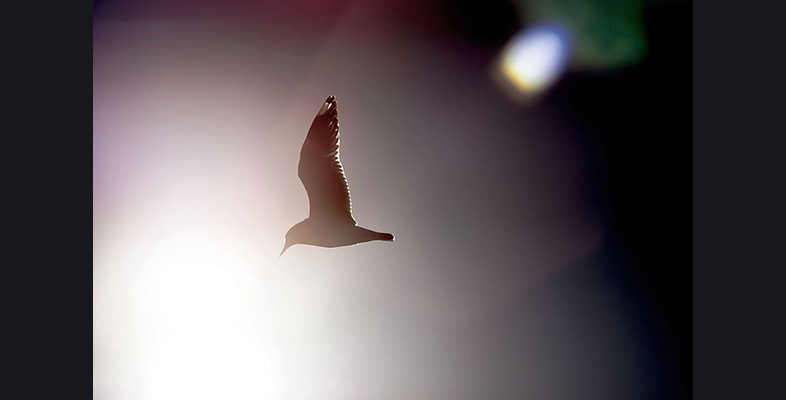In the utterly saturated realm of 2D image capture, few discoveries remain after 200 years of furious snapping. Inspiration of any noteworthy quality is rarely roused. The whole idea of permanently freezing a visible moment—with something other than the mind—makes it one of the more peculiar ambitions, one prone to stultifying repetition. We’ve arrived at that place where even the highest-paid savant struggles to avoid “rehash” and “history repeating” in limitless ways that are new, showing talent in the reinforcement of existing photographic splendor.
…

…
To illustrate this simple point, the evocative image above depicts Big Sur’s iconic McWay Falls—one of the most accessibly photogenic spots on the west coast. There’s an endless supply of eye candy targeting this little slice of Pacific idyll, plus hundreds of pro-level night shots watering down their own niche category. This grand (and uncredited), doctored quasi-photo, as if snatched from a midsummer night’s dream, invokes a storytelling depth that’s nearly lost in the huge search engine field of also-rans. This is among the most uncommon renderings of a place that has been photographed a million times. The ability to frame the shot, to time-lapse, and run flawless Photoshop recomposition and filtering imbues it with a quality that critics might say exceeds the location’s real-life beauty.
When the photo, with its dash of surrealism and furtive evening solitude, is more impressive than McWay Falls itself, the viewer gets pulled through the looking glass because they want to be led there. It’s a cool trick, and quite magnetic. Informing the photographer’s scale of ambition, he’ll one day pull off Route 1 and find no reason to break out the tripod for McWay Falls, sensing his efforts will be meager or widely surpassed by others who have topped him in the craft. What was once unique and inspiring rapidly becomes boring and overcooked.
Astute photographers develop a sixth sense for redundancy and imitation, and therefor surrender to frequent hesitation and self-editing. As ideas about existence on planet Earth frame themselves in the shot, the photographer sifts through an invisible angular survey of options and slips into a notion: “It’s a big deal to find cleverly hidden things with this eye, this lens.” This is a sort-of seasonal hunting instinct, and possibly a maladaptive 21st century form of it, as neo-philosophers such as Susan Sontag would attest in the modern age.
Susan Sontag’s 1977 book On Photography is a must-read for any serious photography buff. Beyond the technical aspects she inserts a good dose of clear-eyed, intellectual (and decidedly leftist) scrutiny to the craft. This excerpt sums it up:
“Photography, which has so many narcissistic uses, is also a powerful instrument for depersonalizing our relation to the world.”
This statement is emblematic of the author’s attitude throughout her dazzling but ultimately deflating analysis of photography, which under varying circumstances she perceived post-modern forms of consumption, theft, and even rape.
Regardless of whether that’s your cup of tea, the truth is she really had something to say about the meaning and content of photography. This alone puts her in a class probably by herself. You’d be hard-pressed to find one other book that even comes close to dealing with the real impact of photography.
And like Marshall MacLuhan, Sontag proves once again that the medium is the message. It is not a book for the sheeple. It’s folly to wonder what MacLuhan and Sontag would have written in 2019 as they deconstruct the latest “irresistible force” in the human-media simulacrum: Social media and bias-infused Mainstream Media that asks us to live in a monoculture where “reality” is filtered and sanitized by Google and the rest of Big Tech. They’re all working together for one political agenda. They suppress free speech and this is a fact. They should have remained neutral. It’s a disaster. Might Marshall and Susan agree?
If you are serious about photography—read her book, even if it makes you angry, and challenges your beliefs.
…

[ when in doubt, “more lens flare” is the answer ]